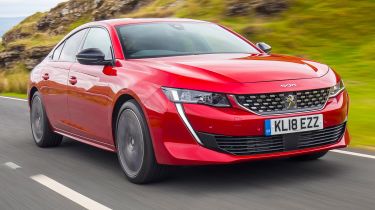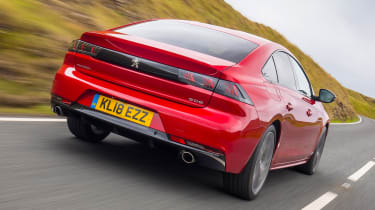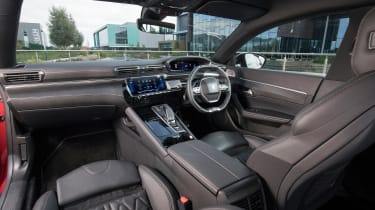New Peugeot 508 GT 1.6 turbo UK review
We drive the new Peugeot 508 petrol in the UK to find out if the class leaders have anything to worry about...

Handsome, frugal and good to drive, the Peugeot 508 offers plenty to the large family car class. There are rivals that are more spacious, but little comes close in terms of style. We’d avoid this top-spec petrol GT model, though; as nice as it is, there are more affordable yet well-equipped options lower down the range.
The mid-size family car segment has diminished almost to the point of extinction. With so many buyers skipping the traditional three-box options for a chunky crossover, cars like the Peugeot 508 have morphed into something a bit more interesting.
And one look at the latest 508 makes you wonder why anyone would give a compact SUV a second glance. Distinctive, sleek, and from the rear three-quarter angle, downright pretty. It’s a car that makes not only the car it replaces look dowdy and tired, but most of its current rivals, too.
Limited-run First Edition model aside, there are four trim levels to choose from. Active models wear 17-inch alloy wheels and get an eight-inch touchscreen with satellite navigation, while the Allure adds a larger 10-inch screen and heated seats. The GT-Line comes with 18-inch alloys, LED headlights and part faux-leather seats.
Used - available now
The top spec GT, tested here, gets full leather, a FOCAL hi-fi and 19-inch wheels, among other desirable extras. There are some pretty cool features on the options list, too: the £1,300 night vision system can detect pedestrians and animals up to 200m ahead. It’s a first in this segment.
In a welcome break from almost all other current manufacturers, the 508 has actually shrunk compared to its predecessor - and it’s lighter too. It’s now 13mm shorter and 70mm lower than a Volkswagen Passat.
Up front, it makes the likes of the Passat (and arguably the BMW 3 Series) look dull. The dashboard design is all swoops and curves, the centre console is set high for a coupe-like feel, and Peugeot’s i-Cockpit, which places 12.3-inch digital dials above a small-diameter steering wheel, offers enough adjustment that most people won’t have any trouble getting comfy. The 508’s perceived quality gives little to nothing away to its German rivals either.
It’s a shame the 508 is fairly cramped in the back though. The Passat, Vauxhall Insignia Grand Sport – and particularly the Skoda Superb – are more spacious, especially for headroom. In fact, anyone who’s six foot-plus will be brushing their head against the 508’s roof lining. Boot space is down on the VW too, but there’s slightly more room than a 3 Series, and the hatchback opening is very easy to access.
The 508 rides on the same platform as the 3008 SUV, and shares a similarly plush ride. Minor low speed fidget aside, even on the 19-inch wheels it’s smooth and relaxing. Yet this doesn’t come at the expense of handling; the steering is light and precise, and although it isn’t as agile as a BMW, it’s still more fun to drive than an Insignia or Passat.
There are five engines to choose from: three diesel and two petrol, while a plug-in hybrid model is due in late 2019. The 222bhp 1.6-litre turbo tops the range – and it’s a revvy, enthusiastic, and strong performer. However, it’s only available in GT trim, and at £35,975 it’s a little too pricey to justify.
For a car that will likely be bought by high mileage drivers (Peugeot predicts 80 per cent of sales will go to fleet users), it’s likely that the the diesels will be most popular. The tried-and-tested 128bhp 1.5-litre BlueHDi unit is hushed enough and dips below the 10-second mark for the 0-62mph sprint.
While the 1.5 is available with a six-speed manual gearbox, the rest of the range is auto only. The eight-speed unit shifts smoothly and responds well in manual mode via the steering wheel-mounted paddles. But it can be just a bit jerky when coming to a stop.
Prices start from £25,000, which makes the closest equivalent Passat 1.6 TDI around £800 cheaper. However, the Peugeot is the better equipped of the pair, is more powerful and, at 74.3mpg, returns better fuel economy (by around 4mpg) in official tests. Fuel consumption is a strength throughout the 508 range, actually: both 2.0-litre diesel models hit over 60mpg, and even the most potent petrol is claimed to achieve 49.6mpg.
Peugeot claims class-leading residual values for the 508, which helps contribute towards the £298.98 per month quoted for a four-year PCP on an Active 1.5 diesel manual. However, Volkswagen currently offers a significant £4,000 deposit contribution for its Passat, which means on a similar monthly rate you’ll be saving £2,300 up front if you go for the VW.














